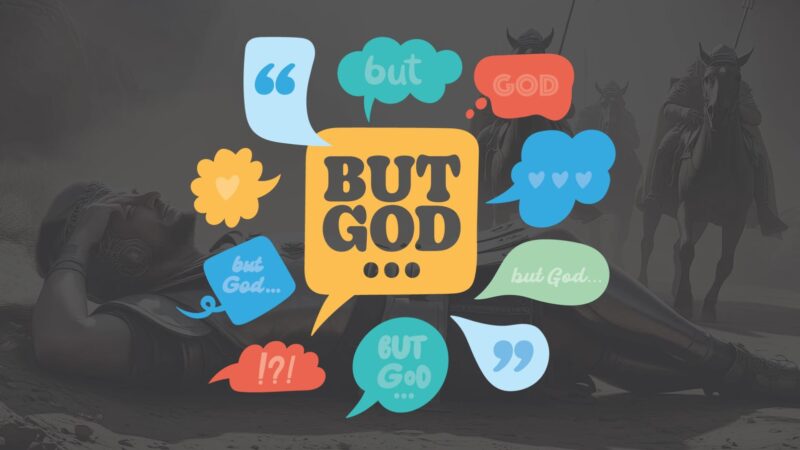When you read the New Testament, how do you picture Saul?
His picture of himself is found in the rearview mirror of Philippians 3:4-6: “If someone else thinks they have reasons to put confidence in the flesh, I have more: circumcised on the eighth day, of the people of Israel, of the tribe of Benjamin, a Hebrew of Hebrews; in regard to the law, a Pharisee; as for zeal, persecuting the church; as for righteousness based on the law, faultless.”
If religion is about obedience to the word of Scripture, Saul’s record was immaculate. If right expression of faith is about purpose and mission, he’s got a solid record there, too. His purpose (mission) was to clean up the mess that had spilled out of Jerusalem and into the world. This Jesus movement, called “The Way,” was getting out of hand. So Saul went to silence it.
But God met the silencer by speaking.
If you’ve read Acts, you know the story. “Suddenly a light from heaven flashed around him. He fell to the ground and heard a voice say to him, ‘Saul, Saul, why do you persecute me?’” (Acts 9:3-4). It’s a story told three times in Acts. When Scripture repeats itself like that, it’s doing what your grandma used to do when she reached across the table and said, “Now listen to me.”
What do we listen for? That God can change anyone? Yes. That the church sometimes fears for its own future? Yes. That grace interrupts the path we think we’re on? Absolutely.
But here’s what’s easy to miss: when Jesus speaks, he doesn’t say, “Why are you persecuting my people?” He says, “Why are you persecuting me?”
Jesus puts no daylight between his cause and the well-being of his followers; we’re meant to read no distance between the risen Lord and the scared, scattered disciples he calls his own.
When Saul lays hands on the church, it’s Jesus who says “Ouch.” That alone should make us think twice about who we exclude, condemn or call “problematic” in the name of preserving the faith. Who do we hurt when we hold to our convictions more firmly than our neighbors? Jesus himself.
Saul is blinded, led by the hand and for three days sits in silence, refusing food and water, because (blind as he is) the thing he can see is the damage he’s done in his zeal.
But God (I love this) goes to Ananias, a quiet man. Neither an apostle nor a bishop. Ananias is credentialed by obedience, and God says, “Ananias, I want you to go to Saul.” And perhaps more mildly than we would have, Ananias says, “Are you sure?”
His literal words are, “I have heard many reports about this man and all the harm he has done to your holy people in Jerusalem. And he has come here with authority from the chief priests to arrest all who call on your name.” (Acts 9:13-14)
Sometimes, we confuse faith with fearlessness; but Ananias is afraid, and he goes anyway. That’s an act of faith.
When he gets there, we have no record of Ananias offering Saul a rebuke or seeking a verification that this religious man wouldn’t go back to his apostle-hunting ways. He doesn’t say, “I told you so.” He says, “Brother Saul.” (Acts 19:17) That’s the first word Saul hears from the church: Brother. Not stranger, not enemy, not “trust, but verify,” but “brother.”
Imagine the power of that word. Imagine if the church learned to say it again.
And so Saul receives his sight — not just physical sight, but gospel sight. The kind that sees Jesus in every neighbor, sees grace in every life, sees mission where there used to be judgment. He gets up, is baptized and the church ratifies its welcome of him by welcoming him with a meal.
The change is so complete that even the disciples don’t know what to do with him. The persecutor is now the preacher. Saul is now Paul.
That’s the part that sneaks up on you. When Saul finally gets going in ministry — when he starts writing those letters that will anchor half the New Testament — he no longer uses his Hebrew name, Saul. He uses his Roman name, Paul. There’s been debate over why. Was it symbolic … strategic? We can’t say for sure. But I wonder if it wasn’t a sign of transformation — of God’s capacity for carrying his past forward into redemption rather than pretending it didn’t happen at all.
Maybe we all need a name for who we’ve become.
The truth of the gospel is that we’re all in the process of losing one way of apprehending the world and gaining another. Said another way: we’re all in the process of regaining our sight — being knocked off our horses, led by the hand, given new sight, welcomed by people we once feared, named again.
And the implication? Simple and hard: if Saul can become Paul, who might your enemy become? And are you willing to call them “brother”?
Not everyone will believe it, of course. Some will keep waiting for the old Saul to return, believing that forgiveness is a demonstration of moral weakness, and that keeping distance from those whose sin is evidence of our strong standing for righteousness. But God is not in the business of graceless returns. The Spirit is (still) in the business of making all things new.
And when the church finally believes that … really believes it … the light that shone on that road to Damascus might shine through us too.
Rev. Ethan Linder is the pastor of discipleship at College Wesleyan Church in Marion, Indiana, and contributing editor at The Wesleyan Church’s Education and Clergy Development Division.
Holy Bible, New International Version®, NIV® Copyright ©1973, 1978, 1984, 2011 by Biblica, Inc.® Used by permission. All rights reserved worldwide.

